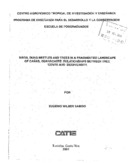Birds, dung beetles and trees in a fragmented landscape of Cañas, Guanacaste: relationships between tree cover and biodiversity
Alternative title
Aves, escarabajos estercoleros y árboles en un paisaje fragmentado de Cañas, Guanacaste: relaciones entre cobertura arbórea y biodiversidad
Description
Tesis (M. Sc) -- CATIE, Turrialba (Costa Rica), 2001 36 ilustraciones. 21 tablas Referencias en las páginas 78-82
Abstract
La agricultura ha alterado la cubierta de vegetación natural y ha fragmentado el corredor centroamericano. Aproximadamente el 63 por ciento del total de tierras de América Central está dedicado a actividades intensivas de agricultura o silvicultura y al menos el 38 por ciento está cubierto por pastos. Esta deforestación ha dejado un gran número de parches de bosque fragmentados dentro del paisaje agrícola. A pesar del claro potencial de los fragmentos de bosque, árboles aislados y otros recursos arbóreos para conservar al menos una parte de la biodiversidad original, pocos estudios han examinado el papel de la cobertura arbórea en la conservación de biodiversidad dentro de paisajes fragmentados. Este estudio demuestra la importancia de la cobertura arbórea a nivel local y a nivel de paisaje para determinar la abundancia, riqueza de especies y composición de organismos presentes. También demuestra la importancia de los fragmentos de bosque, árboles remanentes y sistemas silvopastoriles para la conservación de la biodiversidad en el paisaje agrícola. Los potreros con árboles poseen el potencial de sostener una alta población de espejcies de flora y fauna pero aun menos que el bosque. Finalmente, este estudio demuestra el valor de conservación y la importancia de cada hábitat es distinta para cada organismo ya que cada tipo de hábitat y su cobertura arbórea influyen en cada grupo de organismos de diferentes maneras. Agriculture has altered the natural vegetation cover and fragmented the Central American corridor. Central America has roughly 63 percent of its total land devolved to intensive agriculture or silvicultural activities and at least 38 percent is covered by pastures. This deforestation has left an elaborate myriad of fragmented forest patches within an agricultural landscape. Despite the apparent potential for forest fragments, isolated trees and other tree resources to conserve at least part of the original biodiversity, few studies have examined the role of tree cover in the conservation of biodiversity within fragmented landscapes. The study demonstrates the importance of tree cover at both local and landscape scales in determining the abundance, species richness and composition of organisMON present. It also shows the importance of forest fragments, remnant trees and silvopastoral systeMON for the conservation of biodiversity in agricultural landscapes. Pastures with trees in them hold potential to support a substantial number of plant and animal species, although less than that of forests. Finally, this study shows that the conservation value and importance of each habitat differs among organisMON since each habitat type and its associated tree cover affects groups of organisMON differently.
Keywords
LANDSCAPE, BIRDS, DUNG BEETLES, TREES, HABITATS, PLANT COVER, BIODIVERSITY, NATURE CONSERVATION, LAND USE, SILVOPASTORAL SYSTEMSCOSTA RICA, PAISAJE, PAJAROS, ESCARABAJOS DEL ESTIERCOL, ARBOLES, HABITAT, CUBIERTA VEGETAL, BIODIVERSIDAD, CONSERVACION DE LA NATURALEZA, UTILIZACION DE LA TIERRA, SISTEMAS SILVOPASCICOLAS,
Asesor
Harvey, Celia
Publisher
Centro Agronómico Tropical de Investigación y Enseñanza (CATIE)
URI (Permanet link to cite or share this item)
https://repositorio.catie.ac.cr/handle/11554/4550Collections
- Tesis [3115]


